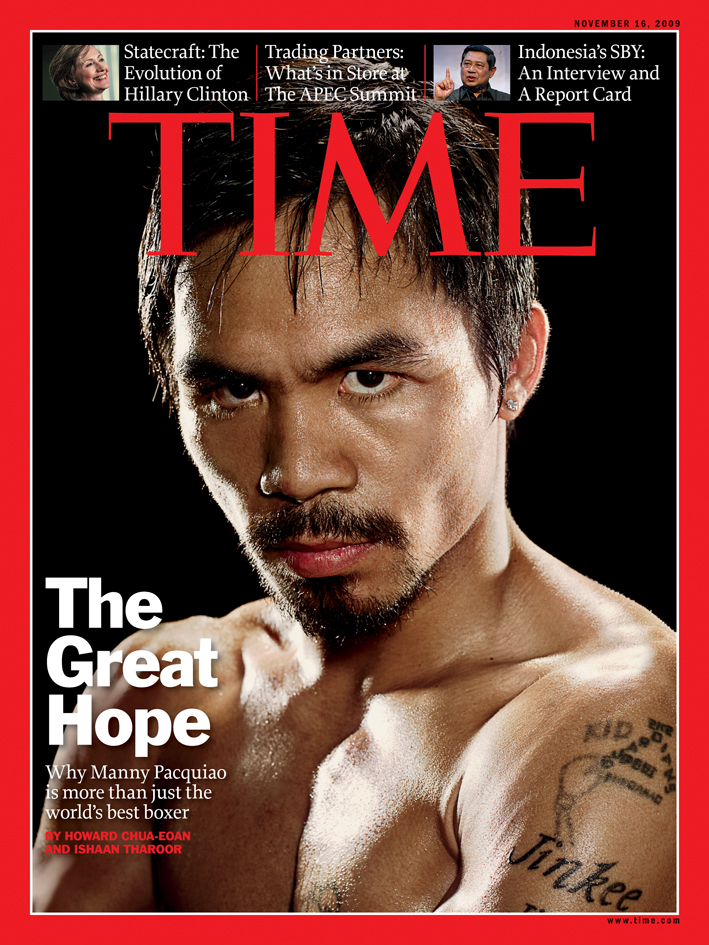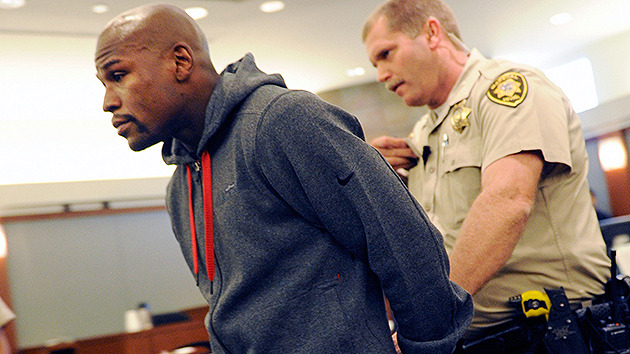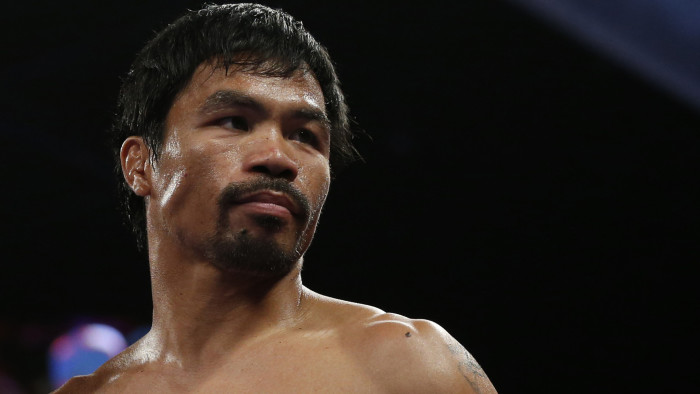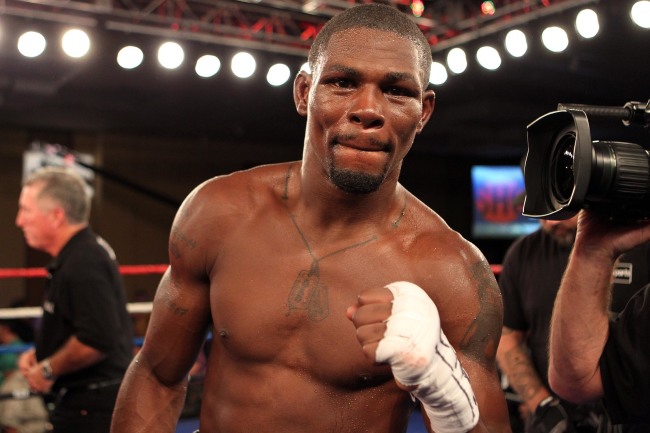Pacquiao Off His Pedestal
Comparing disfavorably a significant subset of the human population to animals is not a good way to win friends, especially when the one speaking had for so long been regarded as a beacon of inspiration for the downtrodden and marginalized of the world. Manny Pacquiao rose through extreme poverty and seemingly-impossible odds to become one of the world’s best fighters, a mega-celebrity, an unofficial ambassador of goodwill, and even a presidential hopeful in his native Philipines. But the Pacman’s appeal took a gigantic hit last week when he nonchalantly declared that homosexuals are worse than animals–even though we’re all, technically speaking, animals.
Manny Pacquiao thinks of homosexuals as sub-human and sub-animal because of their sexual preference, which his Christian church has instructed Pacquiao is, at worst evil, and at best, misguided. In the wake of Manny’s comments, the internet did what it did best, which is blow shit out of all proportion. Rage and vitriol flew from all sides of Pacquiao’s suddenly splintered following: some defended their hero by stating he was only expressing his personal and religious point of view, others decried Pacquiao’s lack of tact, criticized his complete out-of-touchness with the times, or expressed dismay and even anger at the homophobic slur. Some even justified Pacquiao’s comments by reminding us of his political ambitions: if Donald Trump can get away with labelling all Mexicans as rapists in his pursuit of office, then the LGBT community is surely fair game for Pacquiao. One thing is certain: whichever way you feel about Pacquiao’s comments, you can be sure it’s already been expressed somewhere on the internet.

Still, there’s something refreshing about hearing an athlete speak his mind on a subject that doesn’t immediately pertain to his profession–no matter how offensive and ignorant his point of view may be. Pacquiao spoke his mind: a religiously-brainwashed mind unburdened by notions of high-school biology or elementary social studies, and we immediately took it at face value, no questions asked. But that’s not all: when facing the backlash generated by his comments, the Pacman again took a page from Trump’s poli-sci manual, doubling down by re-affirming his position and quoting scripture to support his stance. All in all a stunning and surreal spectacle, considering it all emanated from a man whom HBO’s Jim Lampley, in his trademark, ridiculously over-dramatic voice, once called a “Citizen of the World,” whatever that means.
Take all this into consideration and you can’t but conclude amusement, with maybe a tinge of discomfort, would’ve been an appropriate response. Yet feelings of indignation, anger and betrayal immediately flooded social media outlets, all of which further added to the spectacle. The problem is that those who felt betrayed by or angry at Pacquiao didn’t stop to consider the man’s background and upbringing: Pacquiao couldn’t afford to stay in high school long enough to finish it, and he was raised by a deeply conservative family in a deeply conservative country, so much so that his popularity in the Philippines rose a couple of notches thanks to his comments, even as it plummeted in much of the rest of the world. Had the angered mob stopped to think about these factors, perhaps they wouldn’t have been so surprised at finding out Manny Pacquiao isn’t exactly a paragon of progressivism, no matter how inspiring his personal life-story might have seemed as told through the propagandistic cameras of HBO’s 24/7 series.
But that’s par for the course, since those who lobbied to put Manny on the cover of Time magazine, and those who offered him a Nike sponsorship didn’t think about those things either. And this just goes to show that there’s an abysmal disconnect between what sports figures represent to society, and what they actually are. For some inane, unjustifiable reason, society likes to place “successful” athletes–the ones who climb to the top of their sport and earn millions of dollars on their way there–at the top of a shining pedestal, one that the athletes themselves never asked for in the first place, and in all probability don’t deserve. Think about it: when a man or woman spends an inordinate amount of time kicking or throwing or catching balls, or punching a bag, or running around a track, what are the odds he or she has spent an adequate amount of time reflecting on what it means to “live a good life” in the philosophical sense of the phrase?

One of the problems derived from living in a society in which passing judgment is a national pastime is we wrongly equate athletic or professional success with “life” success, and that’s where the pedestals come crashing down, over and over. Boxing, seemingly more than other sports, relishes in reminding us of that fallacy, perhaps because boxing is much less organized than, say, professional football or baseball, where the NFL and MLB impose gag orders to avoid athletes saying anything remotely provocative. For most fight fans, used as they are to the ensemble of outcasts, eccentrics, outlaws and misfits that have always populated the boxing world, Pacquiao’s comments represented little more than amusing reading material to go with their morning coffee. To the rest of the world, however, the Pacquiao debacle serves as a welcome reminder that successful boxers are probably the last people in sportsdom upon whom the mantle of role model should be bestowed, no matter how amenable and tempting their public persona.
For instance, peer behind Joe Louis’ benevolent facade, molded by a savvy PR operation, and you will find a womanizer who dealt for years with a serious drug addiction. Sugar Ray Leonard, the media darling of the 80s, was accused of physically abusing his wife and also struggled with cocaine addiction. As for Floyd Mayweather Jr., Bob Arum initially tried to market him as the heir to Sugar Ray Leonard, a charming and all-around nice guy, only for the Pretty Boy to go on to have a long, cuddly relationship with misogyny. Oscar De La Hoya, the Golden Boy himself, starred in substance-fueled escapades the retelling of which would make most nuns faint. The short of it is the list of fighters marketed as nice guys and role models who then fell dismally short of the mark goes on and on.
Before Pacquiao’s comments of last week–to which you can picture heavyweight champ Tyson Fury, a BBC Sports Personality candidate, nodding in agreement–entire chapters on homophobia and boxing had already been written. This is all proof that when a prizefighter becomes a champion, the title may tell us a great deal about that fighter’s ring prowess, but it divulges nothing at all about his personal values or his quality as a person. All this should elicit a condescending “Duh!” from anyone reading this, yet the response to Pacquiao-gate on Twitter and Facebook leads us to believe otherwise.

Pacquiao is not the first to fall off the role-model pedestal, and he won’t be the last. This latest scandal, surfacing in the weeks preceding what is being billed as his final bout, and in the aftermath of the Pacman’s stinky performance against Mayweather Jr. last year, can be seen as little else than a final nail in the coffin of Pacquiao-mania. Nike cut him off, celebrities distanced themselves from him, Bob Arum—despite Pacquiao’s undying loyalty to the Bobfather—chastised him as loudly as he could, and even hardcore fight fans are leaving him in droves, flocking to a new generation of prizefighters.
So it’s bleak times in Pacquiao-land these days, but that doesn’t mean there isn’t a way to turn this experience into a learning opportunity for the rest of us. From now on, every time a so-called role model falls off the pedestal we absurdly placed him on, let’s take it as a chance to not channel our anger and indignation at the sportsman spouting trash, but let’s instead consider (and, hey, maybe even laugh at!) our own stupidity in imbuing athletes’ success with a meaning that just doesn’t belong there. There’s no doubt Manny Pacquiao was a great fighter, a phenomenal one even, and nothing he says or does can take that away from him now. But Manny Pacquiao, the person and politician, is a wholly different matter, and we were wrong to assume things had to be any other way. The homophobia is all Manny’s, but that mistake is on us.
–Rafael Garcia






Pacquiao tried to be the good guy. More expectations come with that than being Money Mayweather or The Baddest Man on The Planet.
Anybody else notice that Pacman is really punchy now? He used to speak English quite fluently and now he barely tries anymore–preferring to use a translator.
It should be noted that Nike performs businesses in Saudi Arabia, a country that kills homosexuals.
Nike is hypocrictical.
Yeah, and they have had a long and famous relationship with “Asian sweat shops” and all the child labor that goes along with them. It is pretty damn easy for Nike to be the hypocrite, it would seem.